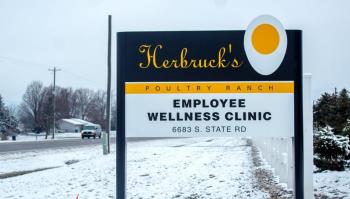Michigan to Mandate Coronavirus Testing of Agricultural and Food Workers
|
08/09/2020 |
|
Gov. Gretchen Whitmer (D) of Michigan signed an emergency order drafted by the Michigan Department of Health and Human Services requiring employers with more than twenty workers on a site to implement testing. Plans explaining the protocols to be applied were due to be filed on August 24th, the date on which mandatory testing will be required. Employers are expected to contract with medical providers to conduct tests with provision for grants to offset costs.
The order mandating testing follows a July order requiring employers to provide PPE in meat and food plants and to follow social distancing where possible.
|

Herbruck's Poultyry Ranch Clinic established in 2019 will be equipped to sample workers |

Gov. Gretchen Whitmer (MI-D) |
There is concern regarding mandating a “testing” program for COVID-19. If molecular technology is used, results must be available within 48 hours to allow employers to place positive workers in home quarantine and to initiate trace testing of contacts. On face value the mandate to test workers appears a well-intentioned exercise but somewhat impractical requirement given the delays in returning results.
How frequently are workers to be tested? In the Tönnies plant in Gutersloh, West Rhine-Westphalia, that recorded a 40 percent incidence rate over a two-week period, workers are now tested twice weekly after resumptions of operations. Molecular testing at approximately $100 per sample will be cost-prohibitive and totally ineffective unless results are obtained within 48 hours. A more practical alternative would be to base testing on antigen detection using a lateral immunoflow assay costing $2 allowing more frequent instantaneous sampling. This will however depend on the availability of an FDA-approved test with sensitivity in the region of 70 to 80 percent.
|

|
|
|